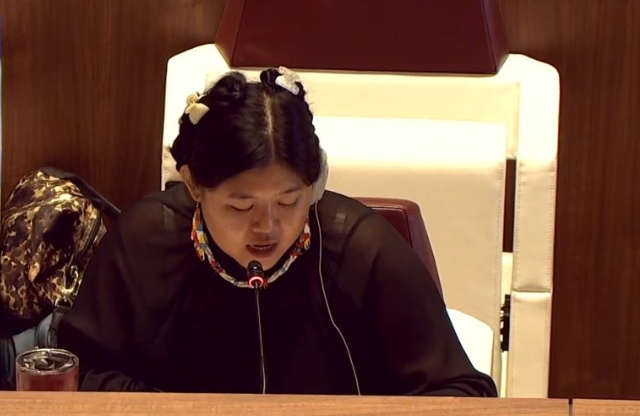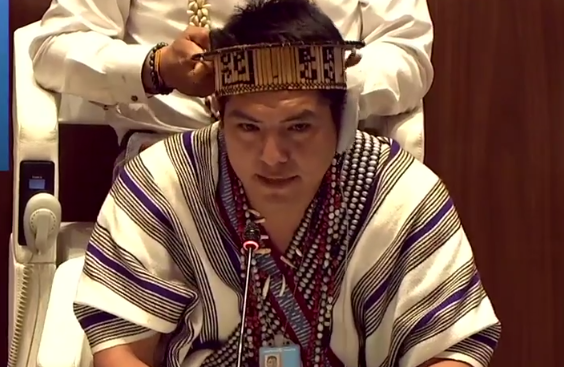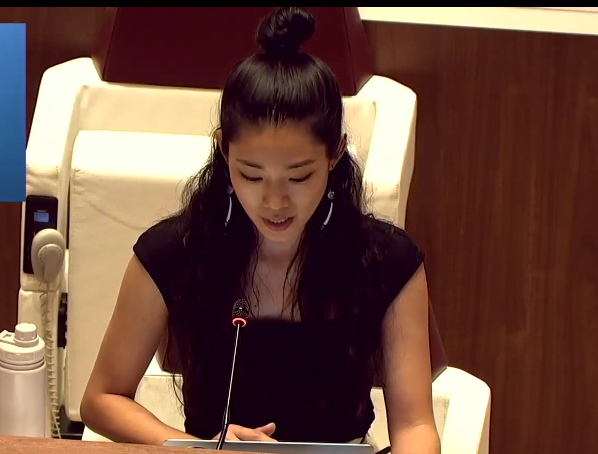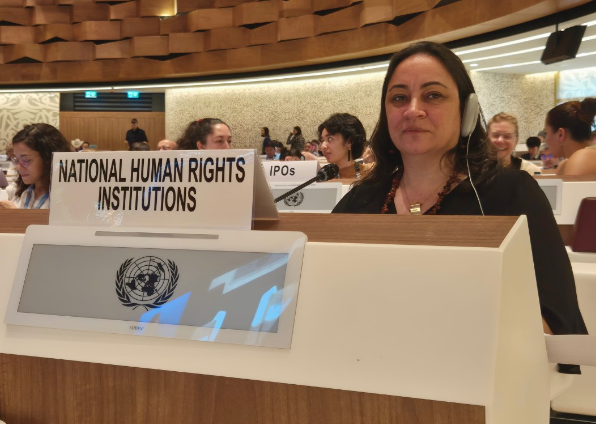Indigenous Expose Racism and Genocide at U.N. -- Governments Rush to Deny Abuses and Insult Presenters
By Brenda Norrell, Censored News, July 14, 2024
GENEVA -- Indigenous youths spoke with courage and eloquence, calling out the environmental racism and genocide carried out by governments around the world. In response, government representatives rushed to deny the human rights abuses, and in some cases, used insulting language to criticize Indigenous Peoples who exposed their abuses, during the U.N. Expert Mechanism on the Rights of Indigenous Peoples.
The representative of France denied the government is responsible for genocide in New Caledonia. Azerbaijan denied responsibility for genocide in Armenia and used derogatory accusations, describing speakers as frauds and part of a "smear campaign."
The United States government failed to describe the ongoing seizure of Native ancestral lands for lithium and copper mines, and fake green energy projects targeting ceremonial places.
The Russian Federation government criticized speakers on Thursday. Responding to speakers statements, he said their status needs to be examined. He claimed some had lost touch with their communities, and some were funded by former colonial powers. He also said one organization presenting a statement was not recognized in Russia.
"We need to exclude the participation of chauvinists and racists," the Russian Federation government representative said.
Speaking with Truth and Power: Indian Boarding Schools
 |
| Jen Proctor Andrews, Coquille, described how children were beaten in boarding schools in the United States, as the government tried to eradicate Native languages. Screenshot by Censored News. |
 |
| Amanda Walter Mojilip, on behalf of the Network of Indigenous Peoples of Malaysia / Jaringan Orang Asal SeMalaysia, Sarawak Dayak Iban Association. Photo AIPC. |
Indigenous Peoples in Malaysia said the U.N. Expert Mechanism's engagement last year has not resulted in any substantial results. They point out the dams and a national park are being built without free, prior and informed consent, and displacing Indigenous Peoples.
"We acknowledge the Malaysian government’s intervention last year, to engage with the Indigenous Peoples and Expert Mechanism constructively. However, there has been no substantial engagement, highlighting the unwillingness among Member states in Asia, including Malaysia to adhere to our rights enshrined in the United Nations Declaration on the Rights of Indigenous Peoples," said Amanda Walter Mojilip, on behalf of the Network of Indigenous Peoples of Malaysia.
The United States representative failed to admit the current push for destructive fake green energy projects that are targeting Native ceremonial places and burial sites for lithium and copper mines, and wind energy projects.
The U.S. representative, Michael Orona of the U.S. State Department, welcomed participation by Indigenous Peoples, but failed to point out the Biden administration's ongoing destruction of Native sacred lands.
The United States made no mention of the lithium mine now digging into the Paiute Massacre Site in Nevada, a mine owned by Canada's Lithium Americas, or the fact that the U.S. government has joined Rio Tinto mining of Australia in the federal court fight against San Carlos Apache.
Apaches are struggling to protect sacred Oak Flat from a copper mine in Arizona. Rio Tinto blew up 46,000 years of ancient Aboriginal history and culture in caves in Australia. Rio Tinto was forced to admit the widespread sexual assaults at its mines in Australia and South Africa.

The government of Azerbaijan denied responsibility for genocide in Armenia. Screenshot by Censored News.
The government of Azerbaijan denied it is responsible for genocide in Armenia and said the statements made by Indigenous Peoples during the session were a "smear campaign." Azerbaijan said they are a "foreign policy tool" who are supporting illegal occupation and separatism.
 |
| Peru's ongoing crimes against humanity include violent repression of Indigenous at protests, an Indigenous representative told the United Nations. Screenshot by Censored News. |
“They have kidnapped him in Aguaytia. They took him to that area and possibly murdered him, said a Kakataibo people leader about the disappearance of the Indigenous leader Mariano Isacama Feliciano in the Peruvian Amazon.”
"Madam President, in my country, the illegal gold miners plunders voluntarily dump mercury into the Maroni River, which is one of the largest rivers feeding the country and the indigenous peoples in most of French Guyana," Linia Opoya, president of the Association of Mercury Victims told the U.N.
 |
| Japan refuses to recognize an ancient language and its people, a representative told the U.N. Screenshot by Censored News |
Aboriginal and Torres Strait Islander Social Justice Commissioner Katie Kiss
Association of Mercury Victims: Indigenous of French Guyana
Expert Mechanism on the Rights of Indigenous Peoples
17th Session, July 2024
Agenda No. 3: Declaration on the dumping of mercury in the Maroni River
Statement
Madam Chair, I am honored to take the floor at this 17th session of the EMRIP to read my statement as indigenous Wayana peoples of French Guyana. I am Linia Opoya, OHCHR Indigenous Fellow and President of the Association of Mercury Victims.
Madam President, in my country, the illegal gold miners plunders voluntarily dump mercury into the Maroni River, which is one of the largest rivers feeding the country and the indigenous peoples in most of French Guyana. But unfortunately, all the animals that live there are contaminated, and with them human beings, particularly the indigenous peoples. I too am a victim, and for this reason I have come to bring our concerns to this mechanism.
I recommend that the mechanism :
Look into the management of toxic waste and the use of heavy and dangerous metals on indigenous lands by illegal gold mining looters;
The State should regulate the exploitation of mining resources, taking into account their environmental impact;
A visit by the Special Rapporteur to see the impact of mercury on the population and indigenous peoples;
---
Thank you, Madam Chair,
I make this statement as Australia’s Aboriginal and Torres Strait Islander Social Justice Commissioner, on behalf of the Australian Human Rights Commission, Australia’s National Human Rights Institution.
I acknowledge the work of the Expert Mechanism and those who have contributed to this important study.
Madam Chair,
On 14 October 2023, Australia held a national referendum to recognise Australia’s First Nations peoples in its Constitution, including the establishment of a Voice to Parliament that would enable First Nations participation in decision-making that affects them.
While the majority of First Nations peoples – and approximately six million non-Indigenous allies – supported a constitutionally enshrined Voice, the public debate was marred by racist discourse, and a successful campaign of mis and disinformation, and the majority of Australians voted against it.
Consequently, in Australia there is no constitutional recognition of First Nations Peoples, and no legislative commitment to comply with human rights standards, to implement the Declaration on the Rights of Indigenous Peoples, or to facilitate Indigenous participation in decisions that affect them.
For example:
the destruction of the 46,000-year-old cultural heritage site at Juukan Gorge by Rio Tinto, has left cultural heritage legislative protections across the country in disarray.
the lack of national standards concerning the rights of our children, including legislative or policy guidance on the age of criminal responsibility, resulting in human rights breaches such as detaining children in police watchhouses or holding them on remand for extended periods without access to education, health supports, or rehabilitation.
And despite having a Racial Discrimination Act in place in Australia, systemic, structural, and overt racism is commonplace for First Nations peoples and has risen exponentially since the 2023 Voice Referendum.
And finally, while governments support First Nations voices in decision-making through Advisory or Expert Committee structures, including jurisdictional processes to progress truth and treaty arrangements, this cannot be a substitute for State responsibility to protect First Nations rights.
The absence of bipartisanship and nationally agreed standards enables State ambiguity on their responsibilities to protect the rights of First Nations peoples.
Recommendations:
As such, we endorse the Expert Mechanism Advice No.17 (2024), and we recommend that the Expert Mechanism on the Rights of Indigenous Peoples:
continues to monitor and follow up with States regarding their obligations under Article 38 of the UN Declaration on the Rights of Indigenous Peoples.
encourages the Human Rights Council to pursue compliance with Article 38 of the Declaration as a standing agenda item for its annual half-day panel discussion on the rights of Indigenous Peoples.
Thank you.
---
South Australian Commissioner for Aboriginal Children and Young People:
Thank you, Madam Chair. My name is April Lawrie, I am a proud Mirning and Kokatha woman from the Far West Coast of South Australia. I speak today as the South Australian Commissioner for Aboriginal Children and Young People and I am pleased to contribute to the 17th session of the Expert Mechanism on the Rights of Indigenous Peoples. I start by paying respect to my Ancestors and the Ancestors of all those Indigenous peoples gathered today. I also acknowledge Aboriginal children, young people, their families and communities of whom I seek to represent.
An integral responsibility I have as Commissioner is to ensure the State of South Australia adheres to the United Nations Declaration on the Rights of Indigenous People, as well as the United Nations Conventions on the Rights of the Child in promoting the rights, development and wellbeing of our Aboriginal children and young people.
Madam Chair, I recently completed an independent Inquiry into the removal of Aboriginal children and published the final report to the South Australian parliament titled, Holding on to Our Future. This Inquiry examined the application of the full Aboriginal Child Placement Principle (the Principle) with child removals giving regard to prevention and family reunification. The Principle is right’s based and is an embodiment of the two key aforementioned covenants. The Principle is explicit about the best interests of the Aboriginal child and their right to grow up safely within their family, community and culture. The full Principle provides a culturally responsive standard for Australian child protection service systems to implement across five elements pertaining to children and their families’ needs. The Principle is based on the presumption that legal removal of Aboriginal children from their parents should be a measure of last resort, with emphasis on preventing unnecessary removal and priority instead to Aboriginal community self-determination and the knowledge and experience of Aboriginal people to make the best decisions concerning their children.
The historical and contemporary practices of removal of Aboriginal children disconnects and denies their rights to their families and their cultural identity. South Australia’s current Aboriginal child removal rates are comparable to the levels of removal akin to the Stolen Generations.
Over the past 10 years, there has been a 116% increase in Aboriginal children in state care, where
Aboriginal children make up approximately 5% of the total population of young people under the age of 18, yet they represent 37% of young people in state care. More than 60% of Aboriginal children in state care with non-Aboriginal carers and residential houses. If nothing changes over the next 7 years, the trajectory shows that 14 in every 100 Aboriginal children will be in State care. This is unacceptable and this an indictment on the rights of our Aboriginal children.
In order to make changes, we need to change the way in which decisions are made. It is no longer viable that decision-making for Aboriginal children and families continues to be in the control of the State. In order for the State to achieve the ends of the Declaration, it must recognise that it cannot facilitate self-determination for Aboriginal people, it is a right exercised by Aboriginal people. Aboriginal people must be at the forefront of decision-making and be empowered to design kinship care legislation.
Madame Chair, it is my recommendation that the State of South Australia legally empower and resource the Aboriginal community to implement its own kinship care legislation and program, to uphold the rights of Aboriginal children to remain safely in the care of family, community and culture in accordance with the Declaration and with particular reverence to Articles 3 and 4 on the right to self-determination and self-government of matters relating to local affairs.
Original Series by Censored News
Testimony at U.N. Expert Mechanism on the Rights of Indigenous Peoples in Geneva, July 2024
Kayapo Forest Defenders Urge United Nations to Help Halt Illegal Gold Mining in Brazil https://bsnorrell.blogspot.com/2024/07/kayapo-forest-defenders-urge-united.html
Aboriginal Elder Describes Australia's Child Abuse to United Nations https://bsnorrell.blogspot.com/2024/07/aboriginal-elder-describes-australias.html
Violence and Repression: Indigenous from Russia, Algeria and Nicaragua Appeal to United Nations https://bsnorrell.blogspot.com/2024/07/violence-and-repression-indigenous-from.html
The Mother Tongue: Countering the Identity Thieves of Canada, Russia, Japan and U.S.
The horrific abuse in boarding schools, failure to provide language classes, and government refusals to recognize languages, reveal abuses around the world aimed at silencing ancient languages. https://bsnorrell.blogspot.com/2024/07/the-mother-tongue-countering-identity.html
Indigenous Expose Racism and Genocide at United Nations -- Governments Rush to Deny Abuses and Insult Presenters
France denied its genocide. Azerbaijan and Russia insulted Indigenous exposing them. The U.S. omitted Interior's Sec. Deb Haaland's assault on the Paiute Massacre Site; Hualapai, Apache, Quechan sacred sites for lithium and copper mines; Hualapai battling uranium mining; Tohono O'odham and Apache defending ancient sites from wind energy. https://bsnorrell.blogspot.com/2024/07/indigenous-expose-racism-and-genocide.html
Leonard Peltier's Message Read at Conclusion of U.N. Expert Mechanism on the Rights of Indigenous Peoples https://bsnorrell.blogspot.com/2024/07/leonard-peltiers-words-conclude-un.html
United Nations: Australian Aboriginal Children Seized, Green Energy Impacts Worsen for Saami https://bsnorrell.blogspot.com/2024/07/united-nations-australian-aboriginal.html





2 comments:
Thank you for your ongoing coverage of indigenous people's testimonies at United Nations' forums.
At long last, humankind is exposing racism! In the mid-1970s I witnessed it and I prayed for unity among our Indigenous peoples. I see it coming, and I am thanking Klncutn ahead of time.
Post a Comment